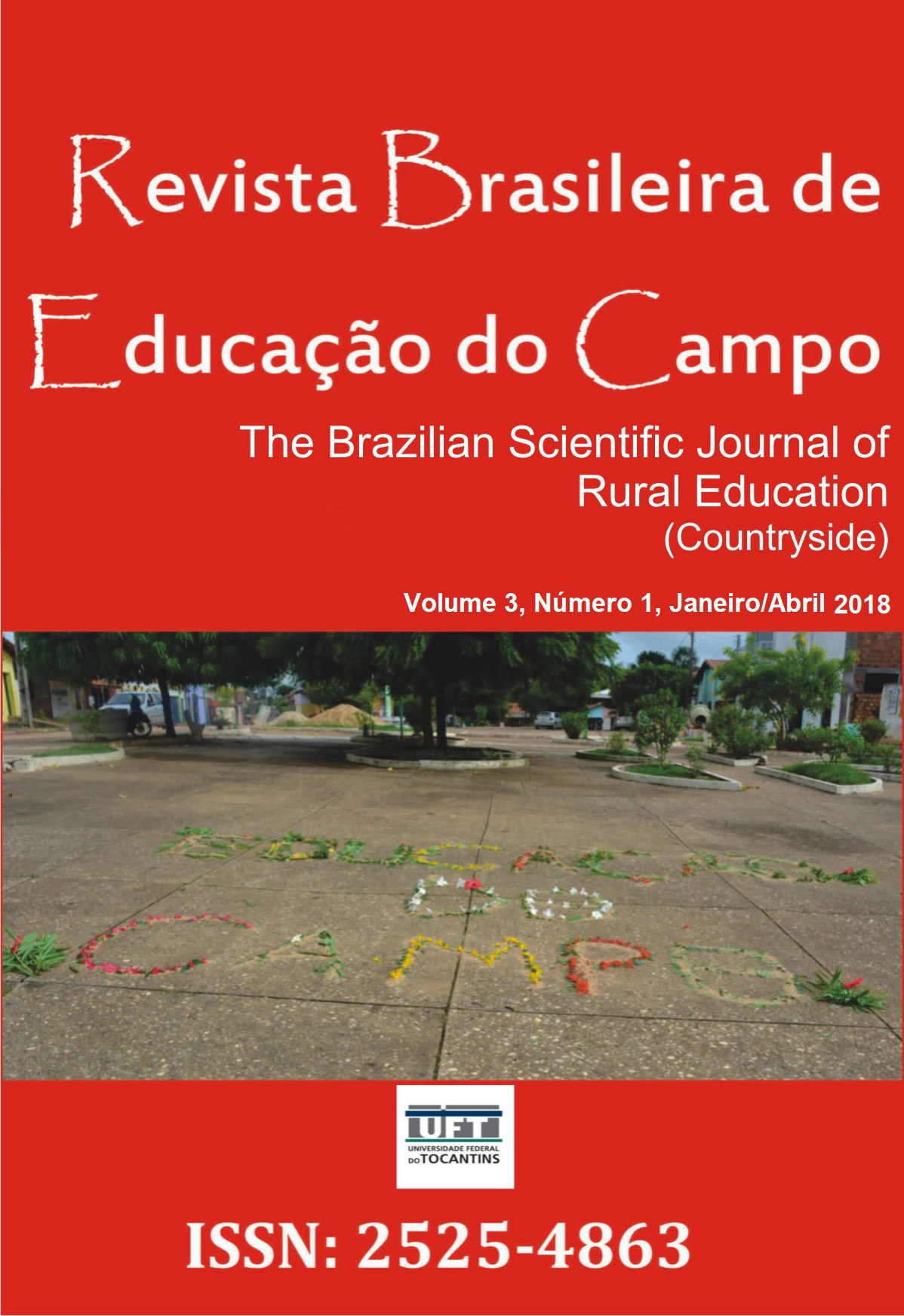Contextualized Education for coexistence with the brazilian Semiarid as an emancipatory practice
DOI :
https://doi.org/10.20873/uft.2525-4863.2018v3n1p104Résumé
ABSTRACT. This work has as main objective to elucidate pedagogical practices that outline a relationship of Education for Living with the Brazilian Semi - arid, from the experience of the Plínio Lemos School - School of the Earth, located in the Zé Marcolino settlement, Prata - PB. This process was consolidated against a methodological proposal of a qualitative approach and from the participant research, based on the studies of Brandão (2002, 2006). The proposals found in the research emerge from the struggle for a rural school, with the proactively of the mother sand materializes in front of the construction of a school that starts to consolidate pedagogical proposals based on Education for Coexistence with the Brazilian Semiarid. These proposals are visualized in the practice of the educators that allow an educational context based on the teaching and collective learning, through exchanges, scan sand contextualizations, facing the reality of the subjects involved in the education al process. In this way, it was possible to identify emancipator actions that reveal the stereotypes destined to the semi-arid region sand their subjects, as they begin to resignify their identities and build a new educational conception, based on emancipation and autonomy.
Téléchargements
Références
Araújo, A. M. R. B. (2009). Práticas de intervenção social em escolas rurais: uma iniciativa para o fortalecimento de escolas do campo na Paraíba. (Dissertação de Mestrado). Universidade Federal da Paraíba, Paraíba.
Arroyo, G. M. (2010). Escola: terra de direito. In Antunes-Rocha, M. I., & Hage, S. M. Escola de direito: reinventando a escola multisseriada (pp. 9-14). Belo Horizente: Autêntica Editora.
Bogdan, R., & Biklen, S. (1994). Investigação qualitativa em educação: Uma introdução à teoria e aos métodos. Portugal: Editora Porto.
Braga, O. R. (2004). Educação e convivência com o Semiárido: uma introdução aos fundamentos do trabalho político-educativo no semiárido brasileiro. In Kuster, A., & Mattos, B. H. O. M. A educação no contexto do semiárido brasileiro (pp. 27-46). Fortaleza, CE: Fundação Konrad Adenauer.
Brandão, C. R. (2002). A educação popular na escola cidadã. Petrópolis: Editora Vozes.
Brandão, C. R., & Streck, D. R. (2006). Pesquisa Participante: o saber da partilha. Aparecida: Ideias & Letras.
Cordeiro, G. N. K., Reis, N. S., & Hage, S. M. (2011). Pedagogia da Alternância e seus desafios para assegurar a formação humana dos sujeitos e a sustentabilidade do campo. Em Aberto, 24(85), 115-125.
Ferreira, A. B. H. (2000). Mini-Aurélio Século XXI Escolar: o minidicionário da língua portuguesa. Rio de Janeiro: Editora Nova Fronteira.
Freire, P. (1979). Educação e mudança. Rio de Janeiro, RJ: Editora Paz e Terra.
Freire, P. (1987). Pedagogia do Oprimido. Rio de Janeiro, RJ: Editora Paz e Terra.
Freire, P. (1996). Pedagogia da Autonomia: Saberes Necessários à Prática Educativa. São Paulo, SP: Editora Paz e Terra.
Hage, S. M. (2011). Por uma escola do campo de qualidade social: transgredindo o paradigma (multi)seriado de ensino. Em Aberto, 24(85), 97-113.
Kuster, A., & Mattos, B. H. O. M. (2004). A educação no contexto do semiárido brasileiro. Fortaleza: Fundação Konrad Adenauer.
Lei n. 9.394, de 20 de dezembro de 1996. (1996, 23 de dezembro). Estabelece as Diretrizes e Bases da Educação Nacional. Diário Oficial da União, seção 1.
Malvezzi, R. (2007). Semiárido - uma visão holística. Brasília, DF: CONFEA - Superintendência de Comunicação e Marketing.
Mattos, B. H. O. M. (2004). Introdução. In Kuster, A., & Mattos, B. H. O. M. A educação no contexto do semiárido brasileiro (pp. 27-46). Fortaleza, CE: Fundação Konrad Adenauer.
Mello, M. (2005). Pesquisa participante e educação popular: da intenção ao gesto. Porto Alegre, RS: Editora Ísis - IPPOA - Instituto Popular Porto Alegre.
Oliveira, I. B. (2009). Currículo em tempos de globalização: Desigualdades, diferenças e exclusões. In Pereira, M. Z. C., Carvalho, M. E. P., & Porto, R. C. C. (Org.). Globalização, Interculturalidade e currículo na cena escolar. Campinas, SP: Alínea Editora.
Pinto, M. P. A., & Germani, G. I. (2012). Escola Família Agrícola: um modelo auto gestionário? In Anais do XXI Encontro Nacional de Geografia Agrária (pp. 1-14), Uberlândia, MG.
Resolução CNE/CEB n. 1 (2002, 3 de abril). Institui Diretrizes Operacionais para a Educação Básica nas Escolas do Campo. Recuperado de: http://portal.mec.gov.br/escola-de-gestores-da-educacao-basica/323-secretarias-112877938/orgaos-vinculados-82187207/13200-resolucao-ceb-2002
Taffarel, C. Z., & Munarim, A. (2015). Pátria educadora e fechamento de escolas do campo: o crime continua. Revista Pedagógica, 17(35), 41-51.
Tonneau, J. P., Caniello, E. S., Sabourin, E., Leal, F., Duqué, G., & Orós, J. (2008). Universidade Camponesa no Brasil Documento técnico e avaliação do 1º ciclo da UNICAMPO. Campina Grande, PB.
Téléchargements
Publié-e
Comment citer
Numéro
Rubrique
Licence
Proposal for Copyright Notice Creative Commons
1. Policy Proposal to Open Access Journals
Authors who publish with this journal agree to the following terms:
A. Authors retain copyright and grant the journal right of first publication with the work simultaneously licensed under the Creative Commons Attribution License that allows sharing the work with recognition of its initial publication in this journal.
B. Authors are able to take on additional contracts separately, non-exclusive distribution of the version of the paper published in this journal (ex .: publish in institutional repository or as a book), with an acknowledgment of its initial publication in this journal.
C. Authors are permitted and encouraged to post their work online (eg .: in institutional repositories or on their website) at any point before or during the editorial process, as it can lead to productive exchanges, as well as increase the impact and the citation of published work (See the Effect of Open Access).














